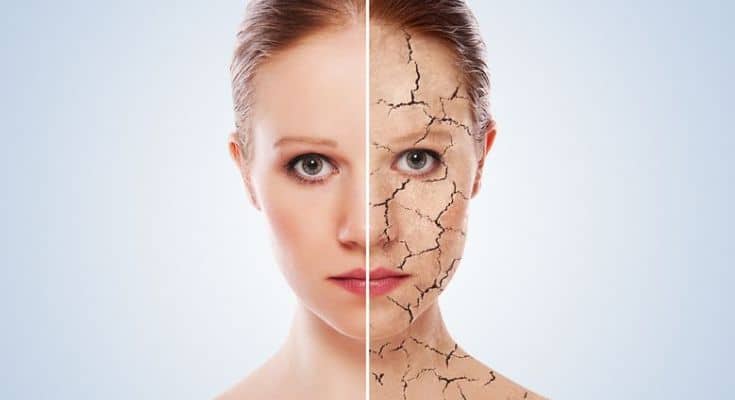We often hear the phrase, “you are what you eat,” and this couldn’t be more accurate when it comes to the quality of our skin. Our diet plays a significant role in not only our weight, but also the health of our skin. Surprisingly, even some seemingly healthy foods can negatively impact skin conditions such as acne, psoriasis, eczema, and rosacea by causing an increase in sebum production and exacerbating glycation.
In this article, we will explore various foods that may contribute to poor skin health, including those with a high glycemic index that are typically associated with weight gain. Along with these high-sugar foods, we will discuss other culprits that contribute to skin issues like acne breakouts, inflammation, and irritation. By understanding the link between diet and skin health, we can make informed choices about the foods we consume and minimize the risk of aggravating existing skin concerns.
Chapter Overview
Dairy Products

Dairy products, such as cheese and yogurt, hold a prominent place in many diet plans due to their nutritional benefits. Yogurt, in particular, is known for its probiotic properties, supporting gut health. However, concerns have been raised regarding a potential link between dairy products and skin issues like acne.
This concern is partly attributed to the presence of growth hormones in milk, cheese, and other dairy products. The logic is that peak levels of growth hormone occur during puberty, which is often when acne breakouts are most severe.
To address these concerns, we recommend the following:
- Moderating dairy consumption: Balance your diet by including other food groups, instead of relying heavily on dairy products.
- Exploring alternatives: Consider incorporating substitutes like almond milk in place of cow’s milk.
Key Dairy Products:
- Cow’s Milk: widely-consumed and versatile base for many dishes and drinks
- Cheese: diverse in taste and texture, depending on dryness and aging
- Skim Milk: lower-fat alternative to whole milk
- Whey: protein-rich byproduct of cheese production
- Yogurt: versatile, gut-friendly, and available in different styles
By being selective and mindful of your dairy consumption, you can still enjoy the benefits of these nutritious products without overdoing it.
Breakfast Cereals
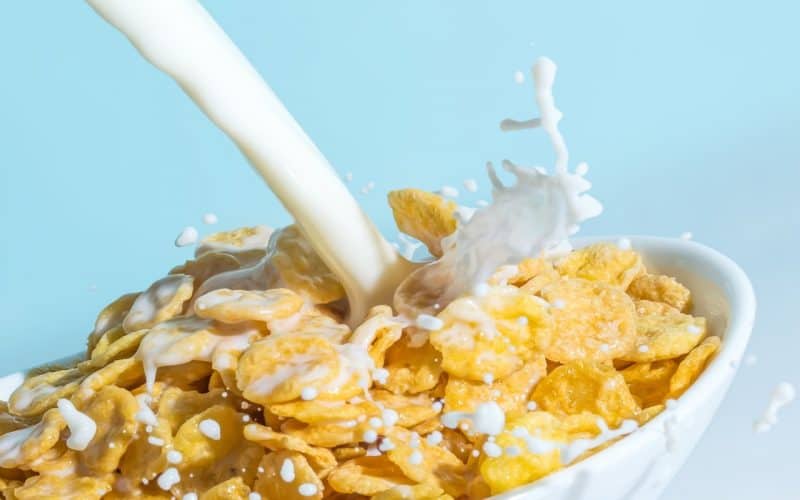
Breakfast cereals are notorious for their high sugar content, which can wreak havoc on our skin. The presence of sugar affects collagen in the skin, leading to premature aging. Additionally, most cereals are highly processed, further contributing to skin issues. High glycemic index foods, such as these cereals, increase blood sugar levels, causing inflammation and related skin problems.
To maintain a healthier complexion, consider these alternatives:
- Whole grains: Oatmeal is a quick and easy option with a lower glycemic index, which helps maintain blood sugar levels.
- Fruits: Adding berries or other fruits to your oatmeal provides natural sugars and antioxidants, promoting better skin health.
- Reduced sugar cereals: Opt for cereals with less sugar and refined carbohydrates to minimize their impact on your skin.
By choosing healthier breakfast options, we can enjoy not only a delicious meal but also better skin in the long run.
Rice Cakes
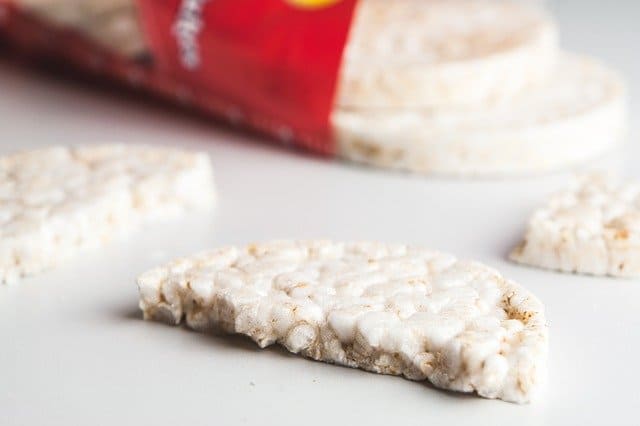
We understand that rice cakes have gained popularity as a low-calorie snack. However, their high glycemic index can impact the skin negatively. To counteract this, we recommend combining rice cakes with low-glycemic index food, such as:
- Peanut butter: a healthy fat that adds satiety
- Fresh fruits: natural sugars, vitamins, and antioxidants
Balancing your snack choices with a mix of glycemic index levels contributes to healthier skin.
Fruit Juices
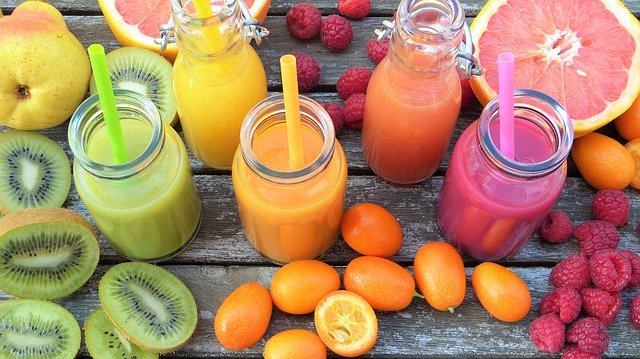
Fruit juices and smoothies are widely considered healthy food choices, especially when compared to soda. However, it is crucial to be mindful of how we prepare them. Combining 3 to 4 fruits in one beverage results in a high sugar content, even if it’s natural sugar. Consuming excessive amounts of sugar can have negative effects on our skin and overall health.
To make healthier choices, consider the following:
- Limit fruit combinations: Stick to one or two fruits per beverage to manage sugar intake.
- Incorporate whole fruits: Opt for eating whole fruits instead of juicing them. This way, we can benefit from the fiber and consume less sugar.
- Watch out for artificial sweeteners: Some fruit juices may contain hidden artificial sweeteners, which can also have adverse effects on health. Always check the label and choose 100% fruit juice options.
By being aware of our fruit juice choices, we can maintain a balanced and healthy diet while still enjoying the refreshing taste of these beverages.
Processed Meats

In our article, we discuss the effects of processed meats on our health and skin. Processed meats like bacon, hot dogs, and pepperoni are known to have high levels of sodium, nitrates, and saturated fats. These elements contribute to several health concerns and skin issues. Specifically, sodium and nitrates tend to break down collagen, resulting in aged, dry, and rough skin. Furthermore, the dehydration caused by high sodium content exacerbates these skin problems. As such, it’s crucial for us to carefully consider the impact of processed meats on our well-being.
Sushi
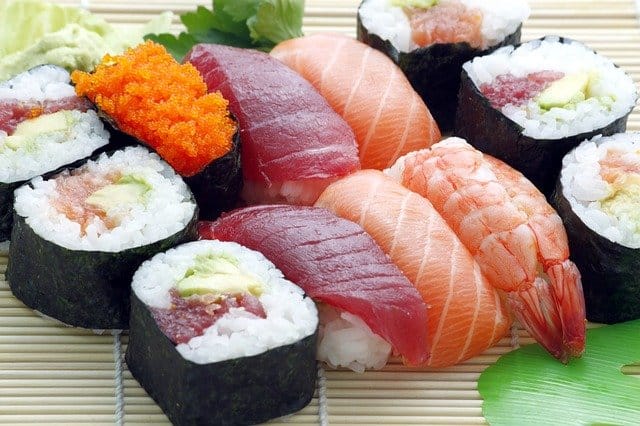
We know that sushi is a popular dish made with fish, which can be great for the skin. However, consuming sushi has some downsides:
- High glycemic index: Sushi is loaded with rice, potentially causing blood sugar spikes.
- Sodium content: Sushi can be high in sodium, especially with soy sauce. Excessive sodium may:
- Dehydrate us
- Contribute to acne
Alcohol

We can’t ignore the effects of alcohol on our skin. Consuming alcohol, especially in excessive amounts, can lead to:
- Dehydration: Hard liquor particularly dehydrates the skin.
- Acne breakouts: Excessive drinking may worsen existing acne.
- Damage: Along with smoking, alcohol can harm your skin.
On the other hand, moderate consumption may provide benefits:
- Red wine: In moderation, red wine is considered good for the skin and circulation.
In summary, keep alcohol consumption within reasonable limits to maintain healthy skin.
Foods Good For Your Skin
We recommend consuming a healthy and balanced diet to achieve glowing skin. Here are some excellent options:
- Omega-3 fatty acids: Found in foods like flax seeds and avocado, they promote collagen production and reduce wrinkles.
- Antioxidants: Green tea, berries, and citrus fruits help in maintaining clear skin.
- Vitamin C: Foods high in Vitamin C, such as mangoes and bananas, boost collagen and fight aging.
- Fiber: Found in whole grains, fiber aids digestion and contributes to clear skin.
- Cocoa powder & coconut oil: Healthy fats that make your skin glow.

